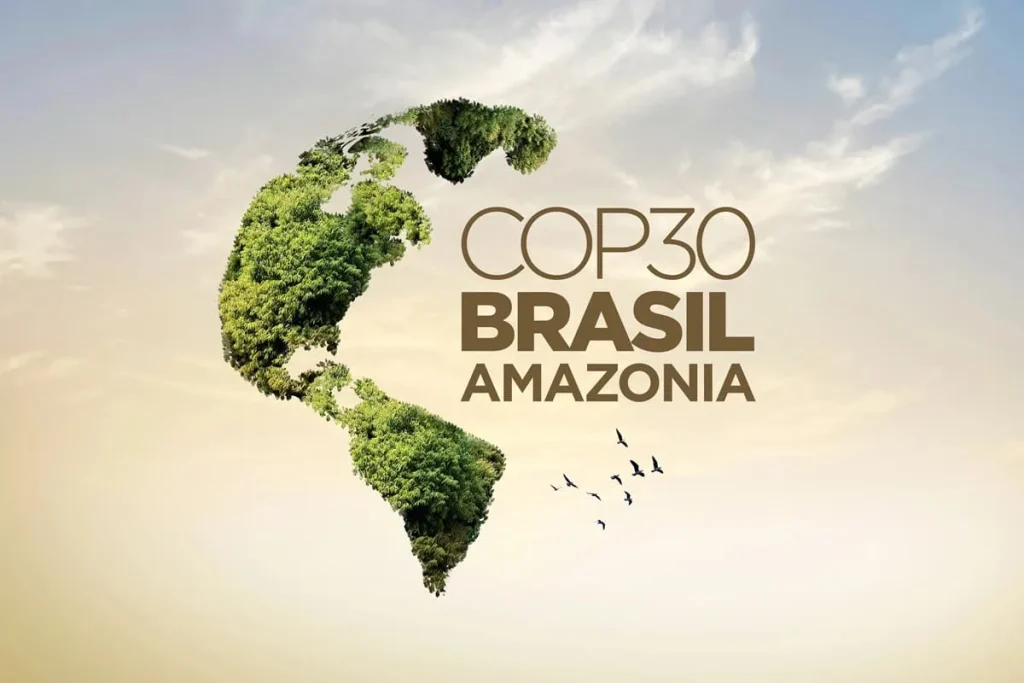SYLLABUS
GS-3:Conservation, environmental pollution and degradation, environmental impact assessment
Context:
Recently, the 30th Conference of the Parties (COP 30) to the United Nations Framework Convention on Climate Change (UNFCCC) was held in Belem, Brazil.
Key Outcomes of the COP 30
- Belem Health Action Plan: It is aimed at strengthening global health systems to cope better with the impacts of climate change. It is structured around two cross-cutting principles and concepts: health equity and ‘climate justice’ and leadership and governance on climate and health with social participation.
- Tropical Forests Forever Facility (TFFF): It aims to mobilise around USD 125 billion through public and private investment, using returns to pay nations that conserve forests. Brazil made the first $1 billion investment in the facility.
- Belem Political Agreement: The new draft text on a political package, presented on the last day of the event, skirted each of the four long-standing issues which are:
- Climate-finance obligation: Demand of the developing countries regarding full implementation of the finance provision contained in Article 9.1 of the Paris Agreement.
- Climate-related trade measures: India, China, and some other developing countries have been flagging concerns related to trade-related restrictive measures, such as the European Union’s Carbon Border Adjustment Mechanism (CBAM).
- Collective Response to the 1.5°C Goal/Fossil Fuels: Developed nations want to see enhanced mitigation actions in pursuit of the 1.5 degrees Celsius global warming target.
- Transparency Reporting Framework: Demand mainly raised by developed countries to have greater transparency in reporting on climate actions.
- Santa Marta conference: The objective of the conference is to explore the legal, economic and social dimensions of phasing out fossil fuels — from trade impacts and subsidy reform to macroeconomic stability, energy security, renewable deployment, and labour transitions.
- The Open Planetary Intelligence Network (OPIN): This is launched for data interoperability, which will accelerate the global climate transformation by unifying critical digital technologies.
- The Global Ethical Stocktake (GES): This initiative seeks to incorporate moral and ethical considerations and civil society dimensions into the global climate action agenda. Its Asia edition was held in New Delhi this September.
- Belem 4x Pledge: It is a commitment by multiple countries to quadruple the production and use of sustainable fuels by 2035, aiming to accelerate the energy transition.
- National Adaptation Plan (NAP) Implementation Alliance: The Alliance is a part of the Plan to Accelerate Solutions (PAS) within the COP30 Action Agenda which aims to accelerate collaboration between the organizations supporting the implementation of NAPs and mobilize public and private investment to advance national adaptation priorities.
- Global Mutirao Agreement: The proposal aims to close the gap between pledges and delivery and serves as Brazil’s high-stakes blueprint for COP30, centred on accelerating progress in energy, finance, and trade.
- Global Implementation Tracker & Belem Mission to 1.5°C: The Global Implementation Tracker will monitor countries’ climate actions. The Belem Mission to 1.5°C will help assess whether national efforts are aligned with the goal of limiting warming to 1.5°C.
- Climate Finance Commitments: Countries committed to mobilising USD 1.3 trillion annually by 2035 to support global climate action. A key part of this is the decision to triple adaptation finance by 2035, strengthening resilience in vulnerable nations.
India’s stance on COP 30
- Climate Finance Obligations: Developed countries must provide climate finance as a legal obligation, delivering scaled-up, predictable, and concessional funding at the trillion-dollar level.
- Advanced Net-Zero Timelines: Developed nations should advance their net-zero timelines and fully meet their Article 9.1 finance commitments under the Paris Agreement.
- Equity and Common but Differentiated Responsibilities and Respective Capabilities (CBDR-RC): Global climate action should uphold equity, CBDR-RC, and climate justice as core principles.
- Fair Multilateral Trade Practices: Climate-related trade policies should avoid unilateral actions, ensuring they do not disadvantage developing countries and remain consistent with multilateral cooperation.
- Strong Focus on Adaptation and Implementation: COP30 should prioritise adaptation and effective implementation, supported by a strengthened Global Goal on Adaptation, the UAE–Belém Work Programme, and the Baku Adaptation Roadmap.
Shortcomings of the COP 30
- No Binding Fossil Fuel Phase-Out: The conference failed to secure a binding commitment to phase out fossil fuels; proposed language was removed in the final negotiations.
- Persistent Climate Finance Gap: The long-standing USD 100 billion annual finance goal remains unmet, with average contributions still around USD 60 billion, leaving a significant shortfall.
- Lack of Strong Enforcement Measures: Several countries highlighted the absence of mandatory emission reduction targets or robust enforcement mechanisms in the final agreements.
- Geopolitical and Negotiation Challenges: Political divisions and geopolitical tensions constrained more ambitious outcomes, underscoring the persistent difficulty in achieving unified global action on climate change.
United Nations Framework Convention on Climate Change (UNFCCC)
- The UNFCCC is an international treaty adopted in 1992 to coordinate global responses to climate change by stabilizing greenhouse gas concentrations in the atmosphere.
- It is the parent treaty for subsequent agreements like the 1997 Kyoto Protocol and the 2015 Paris Agreement, and its secretariat is located in Bonn, Germany.
- The ultimate goal is to prevent dangerous human interference with the climate system.
Sources:
The Hindu
Indian Express
BBC

